Former Halifax mayor Peter Kelly has been fined for altering a watercourse without approval while building a home on an oceanfront property in Queens County, N.S.

Records from Viewpoint show the 4.7-acre property at 112 Eagle Head Rd. was purchased by Peter Kelly and Diana Girouard for $175,000 in September 2021.
Kelly is the former mayor of Halifax who left office in 2012 following multiple controversies.
More recently, he made headlines for being dismissed from his job as chief administrative officer in Charlottetown following accusations he fired senior staff after they brought up issues about financial irregularities at the city.
Now he’s stirring up controversy in a different way. As first reported last week by the Halifax Examiner, those living near the land he bought say the development is harming sensitive wildlife and the environment, as well as blocking public access to Eagle Head Beach.
“I’m heartbroken,” said Talla Corkum, an area resident who attended a protest at the beach Monday afternoon.
“I’ve shed many tears since this has started, and there’s been many people who have shed tears in the community. It’s been such an important place for so many people in the town.”
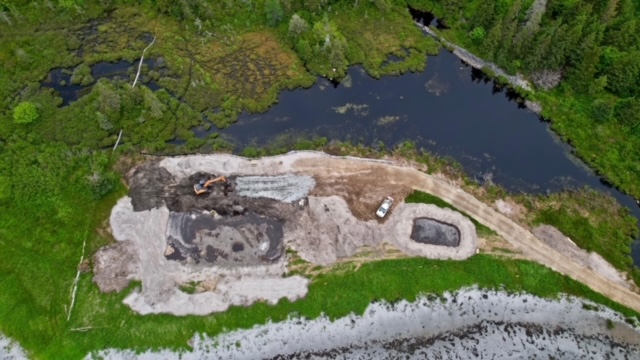
Corkum, a third-year environmental studies student who has lived in the area her whole life, is part of a group of concerned residents called Protecting Eagle Head Beach, which is opposing the construction of Kelly’s home.
She said the development, which started in mid-June, is being built “quite close” to the high-water mark of the beach. Beaches in Nova Scotia are public up to the high-water mark.
Some of the tall grass by the beach has been destroyed, said Corkum, “which can expedite the erosion in the area, as that is the whole webbing that holds the sand dunes together.”
That’s a concern in a coastal area that’s already eroding. Corkum said the previous landowner told the group he lost more than 60 feet of land in two decades.
“So, the erosion is happening, and it’s happening whether the sea grass is gone or not, but now with the sea grass … being killed in the area, it’s going to go significantly faster,” she said.

Get breaking National news
Corkum said the beach and the surrounding area isn’t very well-known, so it’s home to many plants and animals. Snapping turtles, beavers, sandpipers and piping plovers have been spotted there, she said.
Infilled pond
As well, a pond on the property – which is part of a larger network of ponds used by fish to get to the ocean – has been partially infilled.
Members of Protecting Eagle Head Beach have complained to the Department of Environment, and on Monday, department spokesperson Tracy Barron confirmed that a summary offence ticket was issued to the owner of the property for altering a watercourse without department approval. The ticket carries a fine of $687.50.
Kelly declined to comment when approached by Global News at the property on Monday. Girouard, who purchased the property with him, could not be reached for comment.
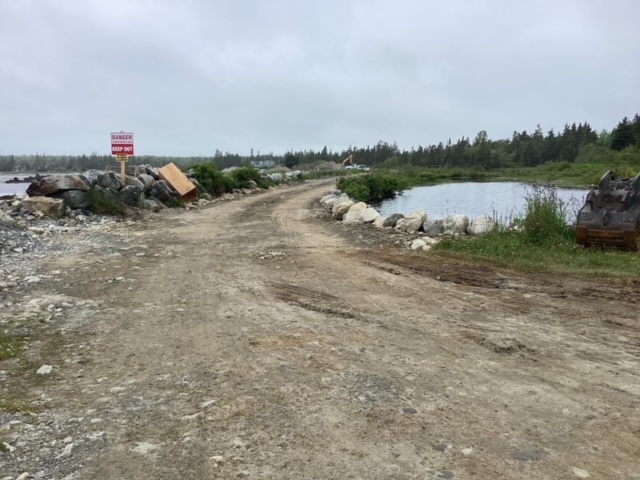
A summary offence ticket was also given to a company for knowingly altering a watercourse at the same location and a directive was issued to the company to remove material by July 8, Barron said. The ticket carries a fine of $1,157.50.
Richard Anthony, the owner of Anthony’s Excavating, the company that was fined, said the fine was related to rocks laid around the edge of the pond to prevent gravel from going into the water.
“We’ve been asked to move them back a foot. That’s the extent of it right there,” said Anthony. “That’s the only thing that’s wrong on that property. Everything is permitted right to death.”
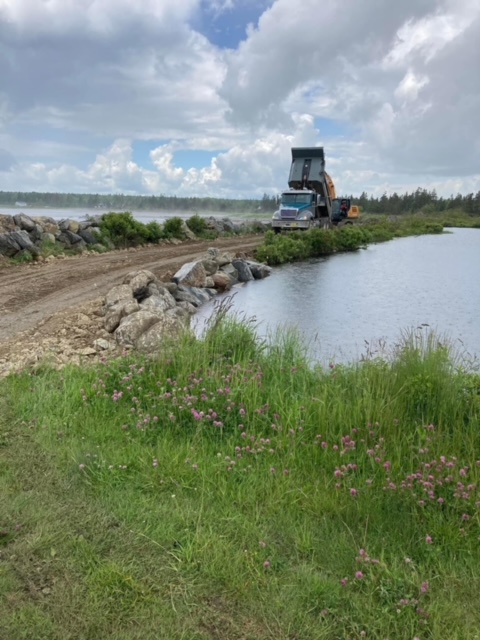
He said the work is happening above the ocean’s high-water mark, on land that is owned by Kelly.
“It’s his private land, and we’re just doing an excavation, taking out the sand because we hit stumps and stuff and putting rock back in its place,” he said. “Then when the foundation, or the concrete slabs (are) put in, the sand will be levelled back off against that.”
Anthony said multiple departments have been to the site and didn’t have any other issues.
“They’ve all been there – DNR, DFO and Environment. The only thing they could find wrong was those few rocks. That’s it,” he said.

In her email, Barron said Natural Resource and Renewables staff continue to investigate reports of wildlife habitat being impacted.
Corkum, meanwhile, said she’s glad to see “some repercussions for the actions we are seeing,” but said it doesn’t go far enough to address concerns around the flora and fauna in the area.
“Of course, we would still want a stop work order more than a fine,” she said.
Beach access
Residents in the Eagle Head Beach area are also raising concerns about public access to the beach.
A footpath through what is now Kelly’s property is used to access the beach, and was also used for decades by local children to get to school.
Peter Leslie, who grew up “spitting distance” from the land in question, said it’s the only way to access the beach by foot from one side of the bay.
“That land was a piece of land that everybody used,” he said. “To access the beach, without having to climb over rocks and things, you have to access this piece of land.”
Now, signs have been placed along the path, which has been turned into a road for the work vehicles, effectively blocking access to those who wish to visit the public beach.
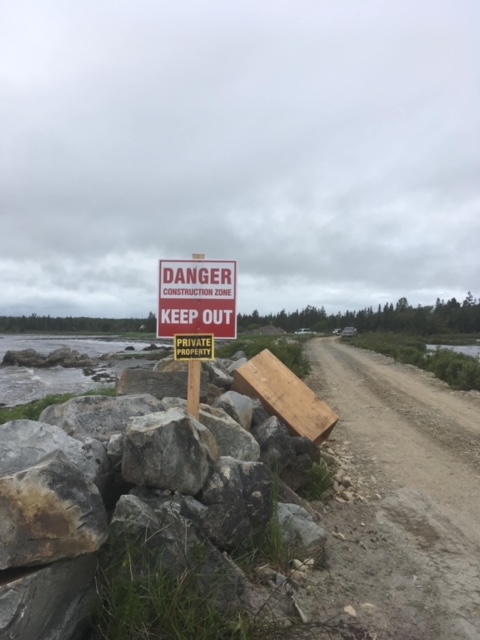
While Department of Environment spokesperson Tracy Barron said Natural Resources and Renewables staff visited the site and found the property owner was not stopping people from using the part of the beach below the ordinary high-water mark – which is owned by the Crown – Leslie questioned that.
“Why would the Department (of Natural Resources and Renewables) make a finding on that?” he said.
Corkum said it’s sad to see the loss of the path, and added that this is part of a “very sad trend” of property being developed on Nova Scotia’s coastlines and the beach access issues that come with it.
She noted that in addition to environmental concerns, coastal landowners also run the risk of losing their property to the sea.
“It is going to be very damaging in the future, for the coast, for the environment, and for them as the ocean will always fight back,” she said.
“I would like (Kelly) to know that with climate change, with erosion the way that it is, is if it doesn’t stop now he will swim later.”
— with files from Amber Fryday
- Trump slams Canada as U.S. House passes symbolic vote to end tariffs
- ‘We now have to figure out how to live life without her’: Mother of Tumbler Ridge shooting victim speaks
- Carney, federal party leaders to attend Tumbler Ridge shooting vigil Friday
- Mental health support after Tumbler Ridge shooting ‘essential,’ experts say


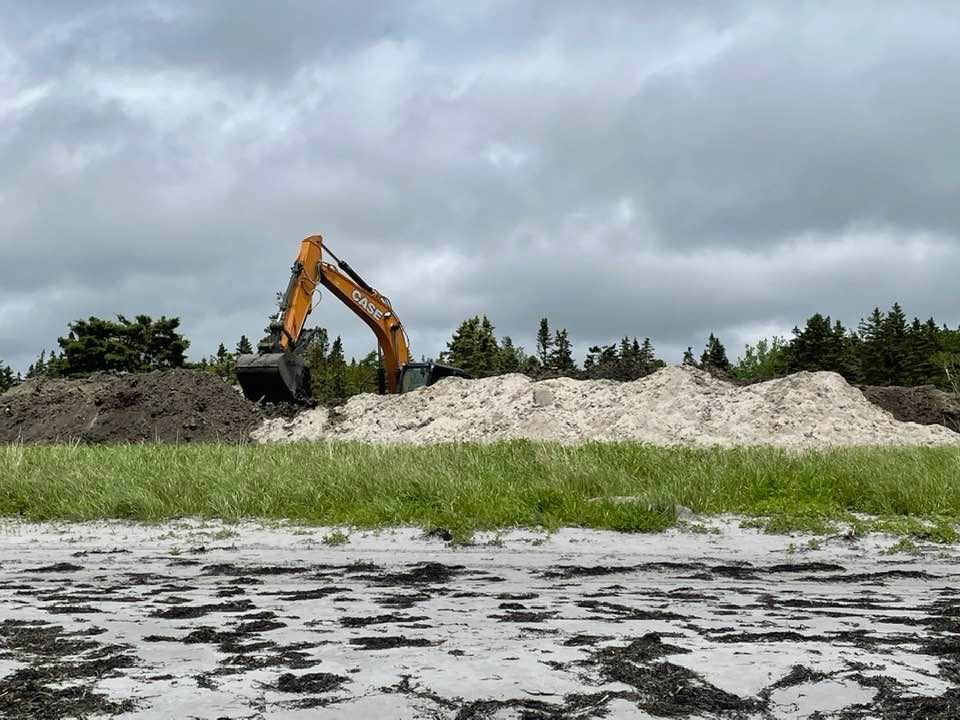








Comments
Want to discuss? Please read our Commenting Policy first.